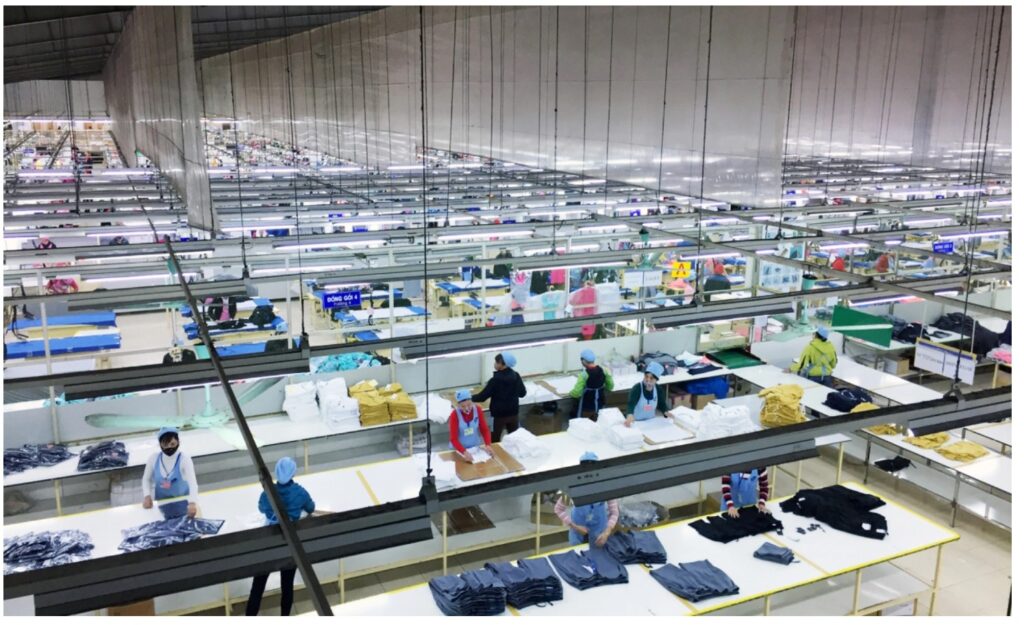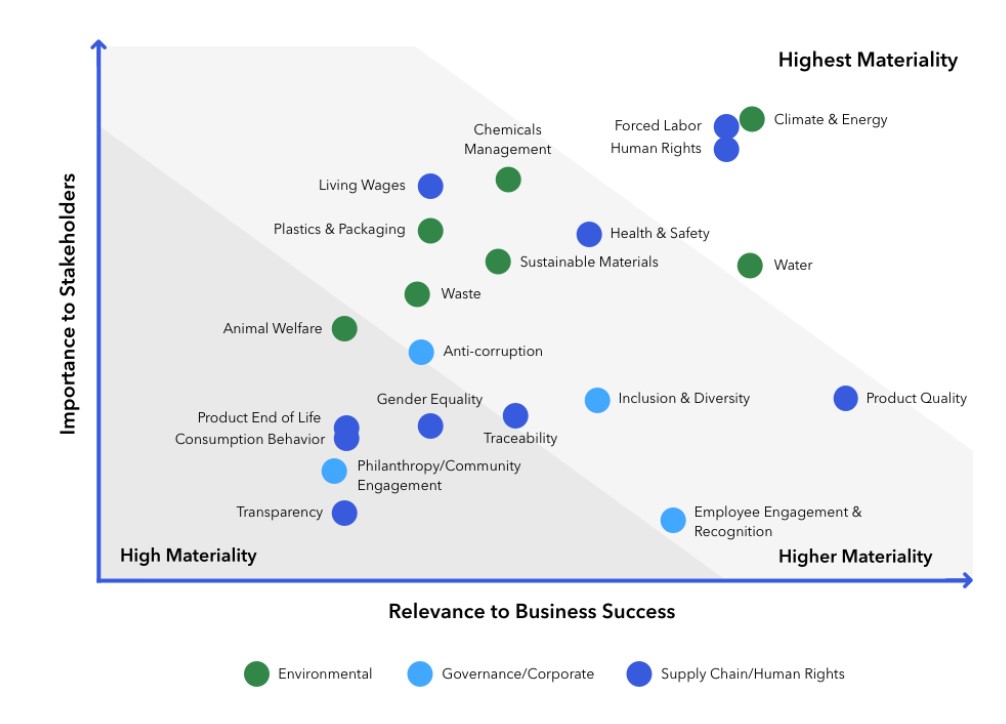Fast fashion is a clothing design and manufacturing method that aims to produce and sell large amounts of cheaply-made clothes extremely quickly. Fast fashion is notorious for its poor ethics and sustainability practices. Today, many mainstream clothing manufacturers rely on cheap labor and do not protect the health, safety, fair compensation, and wellbeing of the employees.
This article will review American Eagle’s factory working conditions in order to assess the company’s workplace safety, labor practices, and environmental sustainability.
Background information: Impacts of the Garment Industry
Table of Contents
Brand: American Eagle Outfitters, Inc.
Environmental Sustainability and Animal Welfare
Brand: American Eagle Outfitters, Inc.
American Eagle Outfitters, Inc. was founded by Jerry and Mark Silverman in 1977 in Novi, Michigan. They offer lifestyle and fashion apparel, such as jeans, tops, hoodies, t-shirts, and more for teens and young adults. Today, American Eagle owns over a thousand stores internationally, placing it among the top 30-50 largest clothing retail stores based in the United States.
American Eagle doesn’t have their own factories in the U.S. Instead, they have manufacturing partners that own 300 factories in 20 different countries, including China, Vietnam, India, and many others in the Global South. American Eagle established monitoring programs to ensure the quality of manufactured products, as well as to keep an eye on whether their factory working conditions protect worker welfare and environmental sustainability. Despite these efforts, the company is still considered a fast-fashion company that produces clothing rapidly in factories, and has faced several complaints and scandals surrounding their treatment of workers
Labor Welfare
American Eagle’s website states that it promotes labor welfare by committing only to manufacturing companies and factories that provide proper treatment and respect to workers. The company also aims to establish a grievance system and management committee for all their partner factories to ensure that workers’ concerns are heard.
American Eagle’s Supplier Code of Conduct creates guidelines that their manufacturing partners must follow. The code of conduct was drafted based on the standards of the International Labor Organization (ILO) and the Universal Declaration of Human Rights.
In 2019, American Eagle established a policy called Forced Labor and Migrant Worker Policy to avoid worker exploitation and forced labor. The policy also protects the welfare of workers by ensuring that they are not charged a fee throughout their recruitment process.
American Eagle also aims to improve the well-being of women workers in its partner factories by providing training and education to help them qualify for managerial positions. American Eagle has initiated training and education in over 30 factories in Cambodia, Bangladesh, India, Indonesia, and Vietnam, benefiting over 55,000 women workers.

Issues and Controversies
Despite these commitments, in 2019, workers from Richa Garment, one of American Eagle’s manufacturing partners, formed a union to protest their unethical working conditions. According to the complaint, Richa Garment employees were subjected to mistreatment, low compensation, and forced resignations.
American Eagle responded to the complaint by stating that it will guarantee adherence to international labor laws, Indian labor laws, and Richa’s Corporate Social Responsibilities.
However, American Eagle also stated that they don’t have control over Richa’s decisions on rehiring the workers that were forced to resign, leading many critics to argue that American Eagle is not doing enough to provide these employees the working conditions and rights they deserve.
The 2021 Fashion Transparency Index gives American Eagle a poor score of 11-20%. The index measures the transparency of the world’s leading fashion brands’ social and environmental actions. This indicates that, despite American Eagle’s assertion of fair labor standards, they still lack transparency when it comes to their actions in the real world. This score also results from American Eagle’s lack of labor standard certifications in their supply chain.
Workplace Safety
American Eagle requires all their manufacturing partners to provide workplace safety training to factory workers. American Eagle or its partners must conduct an annual inspection to ensure that factories are meeting these standards.
In 2013, American Eagle signed the Bangladesh Accord Agreement for Fire and Building Safety to ensure the safety of workers in ready-made garment factories in Bangladesh, one of the countries where American Eagle’s manufacturing partners operate. The accord was also signed by 220 other companies in response to the Rana Plaza disaster. The agreement requires factory inspections, safety training, monitoring of remediation, and implementation of solutions for safety complaints.
In response to the Bangladesh Accord, American Eagle established their own fire and building safety guidelines that create standards for their factories in other countries, including India and Pakistan. This represents an important step towards ensuring workplace safety is achieved even in countries that don’t have strong regulations in place.
The company also signed the International Accord for Health and Safety in the Textile and Garment Industry in 2021.
Issues and Controversies
In 2015, a news organization conducted an undercover investigation of denim factories in China, where American Eagle jeans were manufactured. The investigation discovered unventilated and extremely dusty facilities, where factory workers were instructed to perform a “sandblasting” procedure, which involves spraying pressurized sand into fabrics to create a rusty look for denim pants.
Despite its low-cost and convenience, sandblasting is prohibited in many countries because it can cause serious respiratory illnesses such as silicosis. In the investigation, factory employees expressed concern about dust and poor ventilation and a lack of proper protective gear. Some workers also suffered allergies and loss of appetite due to denim chemical exposure.
Soon after the investigation American Eagle stated that all sandblasting equipment was removed from all of its partner manufacturers’ facilities.
Environmental Sustainability and Animal Welfare
American Eagle has several specific policies on animal welfare, including prohibiting the use of animal fur and endangered animal skins, and animal testing. Alpaca wool and down feathers are only permitted in accordance with Responsible Standards for the product types. Additionally, American Eagle’s leather products are produced in accordance with the standards established by the Leather Working Group.
American Eagle uses the Higg Facility Environmental Module, a set of sustainable standards for the textile industry, to track how its manufacturing partners impact the environment. In collaboration with the Apparel Impact Institute (AII), several of American Eagle’s manufacturing facilities conducted a sustainability improvement program in 2020 called “All Clean by Design”, which saved large amounts of water and electricity. Their review ranked different types of initiatives, including environmental values, based on how much stakeholders cared about the issue and how much the issue impacts American Eagle’s success as a business (below). “Climate & Energy” ranked high on both scales, while animal welfare ranked lower, especially as it relates to business success.

In 2021, the American Eagle established a Carbon Leadership Program, which promotes climate change mitigation plans, monitoring, and reduction of carbon emissions in manufacturing partner’s factories.
Issues and Controversies
In 2020, PETA (People for the Ethical Treatment of Animals) performed an undercover investigation on the largest alpaca farm in Peru, where many major fashion brands, including American Eagle, sourced alpaca wool. The investigation revealed inhumane shearing procedures in addition to other violent treatments of the alpacas.
In response, major brands such as Ann Taylor and Esprit have phased out alpaca wool entirely. While American Eagle has not commented publicly, the company now only sells alpaca wool produced in accordance with the Responsible Alpaca Standard, which helps ensure ethical treatment of the alpacas.
Keep reading: Gucci Factory Working Conditions
